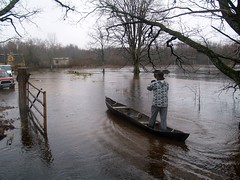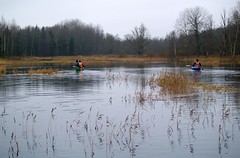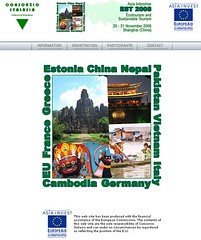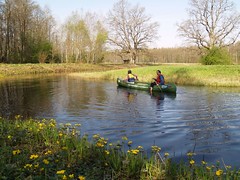Sunday, December 21, 2008
Thursday, December 4, 2008
Fifth season in Soomaa
Tuesday, November 4, 2008
Canoeing on the flooded meadows
Thursday, July 3, 2008
Asia Interprise Ecotourism and Sustainable Tourism 2008
The meetings will be scheduled for the Asian and European companies, taking into consideration their individual requests, the company profiles and their objectives. By organising the matchmaking in this way, Consorzio Italasia and its partners aim to create an arena for meaningful and successful business meetings for the Ecotourism and Sustainable Tourism Sector.
The meetings will take place during the first 2 days of the exhibition China International Travel Mart 2008 Fair in Shanghai on 20th and 21st of November 2008.
The target groups
The project will involve:
30 European companies (12 Italian, 3 Estonian, 5 French, 5 German and 5 Greek) who will explore new business opportunities in the attractive Asian markets. This will lead to an increase in trade and indirect investments.
80 Asian companies (55 Chinese, 10 Vietnamese, 5 Cambodian, 5 Nepalese, 5 Pakistan) from the public and private sector. This will go towards the reduction in the know how gap in relation to ecotourism standards
The Project target groups are:
* tour operators, companies and organisations involved in the tourism and ecotourism sector
* services suppliers (training and education etc.) and consultants (ecolabel certifications etc.)
* equipments suppliers (sport equipments, hospitality equipments etc.)
* hotel construction (non traditional lodging, ecolodge and environmental appliances etc.)
* sustainable transports and infrastructures
The fair
The business meetings will take place at the Shanghai New International Expo Centre, in the framework of the 10th China International Travel Mart 2008 (CITM) that will be held from 20th to 23rd of November 2008 in an area of 57.500 sqm with 2.300 booths. CITM is an annual event that is held in Shanghai and Kunming alternatively. As the largest professional travel mart in Asia, CITM has drawn the attention of people in the tourism industry worldwide. The CITM 2007 covered an area of 50,000 square meters and consisted of 2.193 exhibition booths, including 1.355 domestic booths and 838 overseas booths
Participants in CITM come from all sectors of the travel industry including international and domestic tourist organizations, travel agencies, hotels, airlines and related travel companies.
Further information at:
www.citm.com.cn
Your advantages
* Market survey on the ecotourism sector in the participating countries
* 2 days of individual meetings with pre-selected business partners
* Organisation of an information seminar
* Official invitations to the companies you specifically wish to meet
* Free publication of your company profile on the project website
* Catalogue with an individual page per participating company in English/Chinese introducing your company and products/services
* Free interpreter services during the meetings
* Travel and hotel reservation assistance and facilities
Thursday, June 5, 2008
Promoting ecological tourism
Jun 04, 2008
By Marge Tubalkain-Trell

TALLINN - Ever since the release of the anti-pesticide sensational book “Silent Spring” in 1962, people face the reality of their impact on the environment. What is more, people are becoming aware of how they damage nature when they visit it.
Today airlines and hotel chains are trying to reduce their impact on nature by being more conscious of what they use. Some companies – such as Estonian Air – also plant trees. It’s called sustainable tourism, and ecological tourism is a large part of it.
“Ecological tourism is a narrower term than sustainable tourism. When talking about ecological tourism people mean [things] happening outside tourism structures – what’s out of buses, hotels, planes. Sleeping on a farm is not ecological tourism,” said Aivar Ruukel from the Estonian Ecotourism Union.
Traveling responsibly and standing for nature, culture and rural communities doesn’t mean not having a good time. It is just the activities are a bit different than in a classical vacation.
One thing that surely comes with ecological tourism is learning things that have been forgotten for a long time – whether it’s a handicraft or something else. For example, at the end of June there will be a training course on making one-man-boats.
For those who want to get their hands dirty, there are events called “travel bees.” For example, some are organized to help half-wild and half-cultivated areas, such as meadows, from becoming fully wild.
Estonia has the largest number of different plant breeds in the northern hemisphere – 25 percent of the territory is composed of different kinds of wetlands, while around 15 percent of the country’s territory is protected area. Those interested in nature find Estonia a good place to start.
Since the word “ecotourism” sounds like gibberish to most local people, the Estonian Ecotourism Association prefers to call it real tourism. It has even copyrighted the initials “EHE,” meaning “real and interesting Estonia.”
“We came to the conclusion that Estonian ecotourism can also be named ‘real tourism,’ as it would be more understandable. At the international level, it still would be called ‘ecotourism’ in English, but in Estonia people’s values should be pointed out,” said Mikk Sarv from the Green Party.
Estonia sets safety standards for hotels so that they will be able to cope with a large flow of tourists. But ecological tourism is still at the local level and there are only small groups of travelers.
“The requirements shouldn’t be so hard. It’s not the Hilton Hotel or a giant establishment where thousands of people go through,” said Sarv.
To make matters worse, there is no marketing for ecological tourism, which means people are not really aware of it. Some 75 percent of people who use ecological tourism are Estonians. Much more could be done to encourage foreigners to have eco-friendly vacations.
The countryside is facing an image problem which pundits say is difficult to solve.
“The country is searching for a reason people should come. No one’s coming to Estonia [just] to sleep in a hotel or fly with a plane. Tallinn’s Old Town has been, and will be, the most important travel [destination], but no one has thought of anything besides it. Spas are largely for the internal market and Finns are leaving because prices got higher,” said Ruukel.
Some think the answer is training travel executive. There is also some training offered. Luua Metsanduskool(Forestry school) and Vorumaa Vocational Center include ecological tourism in its program.
They are part of ECOLL, an EU program specifically set up to help people study ecological tourism in four countries – Estonia, Italy, Finland and Poland.
“To discover that our country is exciting, rich and worth visiting outside of Tallinn, the first step is to see rural tourism and then ecological tourism,” said Sarv.
Friday, May 9, 2008
Thursday, May 1, 2008
Canoeing on Lemmjogi River
www.soomaa.com
Soomaa.com Dugout-Canoe Entered a Geotourism Challenge
Dear friends,
We need your support!
We are very excited to be entrants in the National Geographic Ashoka's Changemakers Geotourism Challenge: Celebrating Places, Changing Lives. This is a global competition to surface and recognize innovators in geotourism, defined as tourism that sustains or enhances the geographical character of the place being visited - its environment, culture, aesthetics, heritage, and the well-being of its residents.
Soomaa.com is a featured entrant in this initiative. We are promoting and preserving the building skills and use of traditional dugout canoes (log-boats) of Soomaa National Park, Estonia by organizing workshops, camps and river trips both for locals and tourists. By being part of this competition, we have a great opportunity to get the word out about our work to leaders in the geotourism field, investors, the media, potential partners, and other supporters.
The competition winners will be decided by online voting, so the more people we can inspire, the better!
Please help us rally support for our work:
- Visit our project entry http://www.changemakers.net/en-us/node/7540.
- Leave us feedback about our entry. Here's how:
- If you do not have a Changemakers account, please click here to register on the site. It only takes a couple of minutes.
- Login at the Changemakers website.
- Go to the competition page.
- Visit my entry, read about what I do and leave me feedback! http://www.changemakers.net/en-us/node/7540
- Update your profile and be part of a growing online community of support
- Spread the word to your colleagues and friends through your emails, blogs, or websites. I've included some information about us below that you are welcome to share with others.
This contest can give our work a great boost. Thank you very much for your help!
Aivar Ruukel
www.soomaa.com
Wednesday, April 16, 2008
World’s leading tourism journalists in Tallinn
The 39 journalists of FIJET (World Federation of Journalists and Travel Writers) from 24 countries will be in Estonia from 14-19 April at the meeting organised by the Tourist Board of Enterprise Estonia. The honorary guests at the event are the President of FIJET, Tijani Haddad, who is the former Minister of Tourism of Tunisia and current Vice President of the World Tourism Organisation.
In his opening speech, Juhan Parts stressed the importance of tourism on the Estonian economy and expressed his satisfaction over the fact that FIJET has selected Estonia, where most of the journalists of the federation will be for the first time, as the venue for the conference. “The plenary session of FIJET gives us a good chance to introduce Estonia as a travel destination to the best travel journalists and thus be advertised in the world’s leading media publications,” said Tarmo Mutso, Director of the Tourist Board of Enterprise Estonia.
From 14-16 April, the journalists of FIJET will be in Tallinn, from 17-19 April, they will get acquainted with Saaremaa and Tartu. Enterprise Estonia is organising the visit of the tourism journalists to Estonia within the framework of the programme for introducing Estonia as a travel destination, which is co-funded by the European Regional Development Fund.
FIJET was founded in Paris in 1954 and is the oldest society of professional travel journalists in the world. FIJET has more than 900 members from over 40 countries; it is the largest internationally operating organisation of professional journalists in the world.
See more at: http://www.fijet-web.com
Thursday, January 31, 2008
Bogshoeing
Snowshoes or bog shoes have been used to walk on wetlands throughout the times. Shoes make moving around easier in snow in wintertime and on the soft bog surface all year round. Snowshoes allow access to the places where it is hard or even impossible to reach by foot.
The package includes accommodation at the Victoria Hotel in the centre of Pärnu town and guided snowshoeing trip in Soomaa National Park.
Day 1 – Accommodation at the Victoria Hotel. Dinner in the restaurant Café Grand.
Day 2 – Breakfast at the hotel. Walking guided tour in Pärnu. Dinner in the restaurant Café Grand.
Day 3 – Breakfast at the hotel. Transfer to Soomaa National Park. Guided snowshoeing trip and tea with pie. Dinner at the restaurant Café Grand.
Day 4 – Breakfast at the hotel.
Prices include VAT.
The price of a package changes if there are more or less people in a group.
The package does not include transportation to and from Estonia and Pärnu.
Size of group: min 6 persons
Price: 260 EUR per person
310 EUR per person in a single room
The offer is valid until 31 May 2008
Info and reservation by phone + 372 44 43412 or e-mail: info@victoriahotel.ee
Friday, January 11, 2008
Living Lakes Conference in Estonia
The conference is meant to create an international platform for an intensive exchange of knowledge and experiences. The first two days (February 19 + 20, 2008) will be dedicated to field trips to Lake Peipsi and Lake Võrtsjärv.
At the conference in Tartu, participants will have the possibility to benefit by the wide knowledge of several experts giving a lecture on the issues sustainable tourism development, visitor management of protected areas, sustainable fisheries and land use planning.
The Living Lakes Eastern Europe Network comprises seven organisations from five different countries: Estonia, Hungary, Poland, Lithuania and Germany.
The conference is hosted by the Global Nature Fund, the Peipsi Center for Transboundary Cooperation (CTC), the Lake Võrtsjärv Foundation (LVF), the Estonian University of Life Sciences, Centre for Limnology and the South-Estonian Tourism Foundation and sponsored by the German Federal Foundation for the Environment (DBU), the European Union and the Estonian Environmental Investment Centre.
Read more www.globalnature.org/eastern-europe-conference
Ecoclub.com about Ecotourism in Estonia
Antonis Petropoulus writes about Estonia as a country of "Pristine forests, bogs, meadows and coastline hosting rare fauna and flora and vibrant traditions await the eco enthusiast." Read article The Secret Beauty of Estonian Nature at ECOCLUB.
Read also interview with Aivar Ruukel of Soomaa.com
Read also interview with Mart Reimann of Retked.ee







